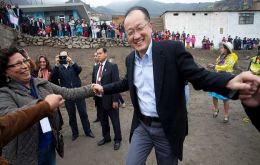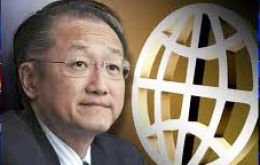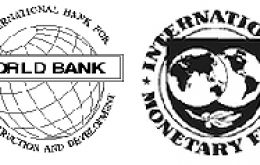MercoPress. South Atlantic News Agency
Tag: World Bank
-
Wednesday, July 3rd 2013 - 04:26 UTC
World Bank President Jim Yong Kim returns to Peru, praises social development

World Bank President Jim Yong Kim is in Peru this week, returning to the place where he says his interest in poverty reduction was first piqued.
-
Friday, June 21st 2013 - 16:52 UTC
World Bank preparing for when US begins to slow money creation

The World Bank is concerned about the spill-over effects on developing countries of a slowing of US money creation and will move to provide affordable capital when borrowing costs rise.
-
Thursday, June 13th 2013 - 06:41 UTC
World Bank cuts global growth outlook as Europe remains in deep recession

The World Bank cut its outlook for global growth, saying the economy should expand more slowly this year than last as it cited a deeper-than-expected recession in Europe and a recent slowdown in some emerging markets such as BRIC members.
-
Friday, April 19th 2013 - 05:46 UTC
Argentina begins Washington round of contacts ahead of IMF-WB spring meeting

Argentine Economy Minister Hernán Lorenzino is in Washington ready to start his official activities in the margins of the 2013 International Monetary Fund and World Bank Spring meeting.
-
Friday, March 22nd 2013 - 21:16 UTC
World Bank outstands Uruguay as a success story in economic and social recovery

Under the heading of: “From crisis to opportunity: supporting an effective economic and social recovery with innovation and flexibility”, the World Bank outstands Uruguay as a success story, from the downfall of 2001/02, mainly consequence of the Argentine melting to the sustained recovery since 2004/05.
-
Thursday, March 7th 2013 - 07:01 UTC
IMF mission in Argentina to check financial system, in framework of G20

Officials from the International Monetary Fund and the World Bank arrived in Argentina on Tuesday to evaluate the country's financial system as part of checkups agreed among Group of 20 nations, according to a report from the official state news agency, Telam.
-
Tuesday, March 5th 2013 - 05:18 UTC
Brazil’s “competitiveness cliff” and commodities dependency exposed in World Bank report

Brazil is not only the biggest country in Latinamerica but also has the largest economy and expects to play a leading role in the global economy in the near future, however a report from the World Bank is not so enthusiastic and points out to a series of challenges the country must address if it wishes to effectively become a super star.
-
Thursday, February 14th 2013 - 20:10 UTC
UK will block IADB and World bank loans to Argentina because of financial ‘misconduct’

UK joined the group of countries that vote against granting multilateral organizations’ loans to Argentina as a form of protesting the mistrust generated by the government of President Cristina Fernandez recurrent international misconduct, reports the Buenos Aires media.
-
Saturday, January 5th 2013 - 05:53 UTC
Argentina among select group with the highest inflation in the last fiv-year period

Argentina is among the world’s countries which experienced the highest inflation in the last five years based on average data from the country’s private consultants and the IMF. The double digit inflation was estimated at 21.3%, an approximate average for the 2008/2012 period, and compiled by IERAL an Argentine business think-tank.
-
Saturday, December 22nd 2012 - 08:03 UTC
World Bank’s arbitration unit receives Repsol’s complaint over YPF nationalization

The World Bank's arbitration unit has agreed to hear a complaint by Spanish oil firm Repsol over Argentina's nationalization of the company's former energy affiliate YPF.
